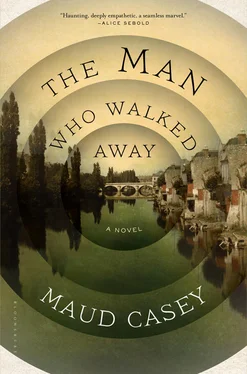“Well, that’s that,” says Walter, a patient who smells mysteriously of pudding, though pudding is never served because the Director forbids sweets, believing them to be one of the causes of the last war. “Even when I turn my back?” he asks. “Those people?” he asks Marian, who wouldn’t eat pudding even if there were pudding because the sun has stolen her stomach.
“Are they there?”
Though she cares for Walter, she doesn’t have the energy to prove him wrong. She is without a stomach; whether people are real or not is not her first concern. “Well, then,” she begins, wandering away in search of the rest of her sentence. “Well. .”
From the window, Walter sees the asylum’s young doctor pedaling past on his bicycle. “Fleetingly improvised concoction,” he whispers.
The Doctor keeps his eyes on the road in front of him in order to steady himself. Pedaling past, he remembers, not for the first time, that the asylum was once a hospital for lepers. On bad days he thinks of the patients as leprous pilgrims, pieces of them falling off as they journey to who knows where; on bad days, doomed, weary visionaries, all of them. “You’ve only been here a year,” the Director often reminds him. “Give it time.” But there are days when all the Doctor can hear is the suck of need, when the patients seem so tired it is as if the recent war has caused an epidemic of fatigue, a generation born into exhaustion.
But today is not one of those bad days. Today the optimism the Doctor felt almost one year ago when he first began his work at the asylum has returned. He is filled with gratitude simply to have been born in the age of mental medicine when there is all of this thinking about, well, thinking. This morning, the asylum seems to him a beautiful, simple vase that gives shape to people who would otherwise spill into an indistinct puddle. Though his good mood may have something to do with the fact that today he will not be going to the asylum at all. Instead, he will take the train all the way to Paris to hear a lecture by the son of a wagon maker who has made of himself a great doctor. A man who receives letters from admirers addressed simply to The Great Doctor, Europe.
But it is, most of all, the Doctor’s bicycle, a recent purchase, which is responsible for his good mood. Since he was a child, he has dreamed of having one of his own, but it was only recently that he could afford it. A pinch, but he has never once regretted the purchase; the bicycle has reignited a childlike quality in the Doctor. Click-clickety-click. There is a system to his pleasure when he rides; his pleasure is the system. He begins always with the bones: stripped of their flesh, hollow and pockmarked, beautiful coral washed ashore. The elegant clavicle and scapula; the gently curved sections of the spinal column: cervical, thoracic, lumbar. The sacrum, the spine’s punctuation. The slender, long fibula next to the stalwart tibia, that sturdy leg bone, only the second largest but which bore more weight than any other. The delicate birdlike bones of the feet: tarsals and metatarsals. The exquisite phalanges, quivering with the movement of the machine, or is it the machine quivering with the movement of his bones? Cranking away — click-clickety-click — the machine itself a miraculous body. Some nights the Doctor dreams of pedaling and he wakes up, his ankles already sore.
His good mood might also be attributed to the lingering effect of last night’s visit to the docks. He woke in the night from his dreams of pedaling, filled with a restless hunger that made his shabby apartment appear even shabbier — the small kitchen dusty from disuse, the ends of a loaf of bread left uncovered nibbled by mice, his bedclothes hopelessly tangled. Even the book by his bed didn’t entice him — he has recently been enjoying an account of a man and his donkey making their way through the country in Cassagnas. He left his apartment and headed out into the night. Though the Doctor has never once been inside the bar underneath his apartment, the bartender always waves to him. He waved last night but the Doctor pretended not to see, continuing on past the Place de la Bourse, past his favorite monument — unfinished, the haunch of a great horse waiting for its rider to be built — past the small cemetery filled with tree stumps like amputees, cut down to make room for more dead. He hurried past, down to the docks, where only a few gas lamps flickered dimly, all the way to the brothels.
“Trouble sleeping?” the woman said when she opened the door. What relief, her pretty tousled hair. His restlessness was given a focus and a task. He muffled the tick, tick of his father’s pocket watch on the dresser with his shirt, his waistcoat, his jacket, until there wasn’t even the dullest echo of that painful sound. The cathedral bells rang up into the sky, disappearing along with her dress, and then he was gone with the bells and the dress, gone into the tang of sharp perfume, into the soft, warm, fleshy relief of her.
“There you are,” she said, taking shape beneath him once again. “Better now?” He had said those same words the day before to Marian, who was weeping over a stolen kidney. The theft caused another patient to wonder if, by divine miracle, she too had had a kidney stolen.
“You’ll be fine,” he said to Marian, leaving Elizabeth to Nurse Anne. “Take her away from the others or we’ll have an entire asylum of kidneyless patients.” He gave Marian a bromide and sat with her until she fell asleep; when she woke up he put his hand on hers. “You are better now,” he said. And she was better. Medicine’s power, secreted away in these small, rehearsed gestures — the steady, unwavering touch, the certain tone giving the ethereal if a solid spine: You are.
“Yes,” he said to the woman lying next to him. “Thank you.”
And for a moment he was better, but as he made his way home the restlessness returned. It was everywhere — in the rows of houses shuttered for the night that seemed on the verge of bursting; in the statue of Diana still dragging the fallen stag, in the statue dedicated to the soldiers who died for their country. When he reached his building, the restlessness was there in the swollen, drunken voices of the same two men huddled at the bar night after night. “Come on, don’t be a stranger,” called the bartender, but the Doctor remained a stranger, climbing the stairs to his room where he put the kettle on for tea, collapsing in the armchair by the window to read the same page from his book until the man in it had knocked walnuts from the trees that lined the road two, three, four times. The fifth time, the Doctor gave up and looked out the window at the stars, so many mysterious pinpricks of light. The kettle boiled, whistling his restlessness: What do you know? What do you know?
Click-clickety-click. The statues of the stern justices stare stonily down at him from the top of the Palace of Justice as he pedals past. And? So? What do you know of medicine? Just wait, he thinks. He watches as the woman, her oilskin hat clutched to her chest, runs to catch up with the handsome man holding his cape open to her as the dove flutters in the cage at his feet. The Doctor knows he is not a handsome man; he is aware his crowded features give him the look of someone who is perpetually worried.
And? So?
“Oh, shut up,” he says out loud, but the wind snatches his words, carrying them all the way back down to the river.
The locomotion of the train hurtles the Doctor along the iron tracks to Paris, rumbling through his feet, up his shins, into his thighs, the base of his spine, and then up each vertebra until he is breathing it. It fills him with a keen sense of anticipation of the sort he hasn’t felt since he was the same age as the children who laughed as the woman retrieved her oilskin hat. The same what next feeling he had as a young boy waiting for the great Léotard, son of a renowned gymnast, a man who wore a spectacular form-fitting outfit, to come pedaling through his hometown on the bicycle with its high front wheel (the same bicycle that planted the seed of longing in the Doctor’s heart). The occasion was the great Léotard’s unprecedented forty-mile bicycle ride, and the Doctor waited with his parents along the side of the road with a throng of others, all of them staring at the horizon, willing something to appear. The night before, the great Léotard had performed a miraculous trapeze feat at an elegant banquet hosted by a duke. Racing into the dining room on his bicycle, he squealed to a stop just before he reached the table, then executed a perfect somersault over the heads of the unsuspecting diners.
Читать дальше












